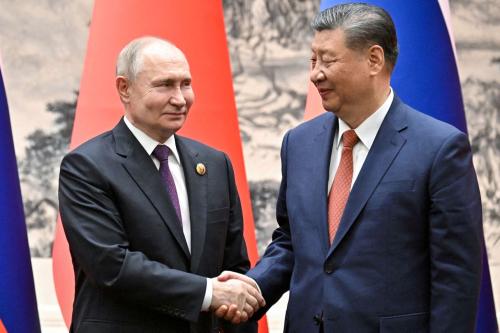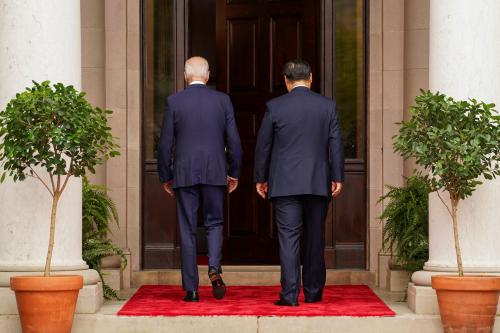By the spring of 2024, China had settled with the reality that the possibility of a second Trump presidency is not only real, but also significant. According to the national polling organization FiveThirtyEight, by May 22, 2024, former U.S. President Donald Trump has a 0.9% lead to President Joe Biden in the national presidential polls, at 41.1% versus Biden’s 40.2%. The guilty verdict in the criminal trial does not seem to have a major impact over the voters, which still is reflected in a 1.7% percent lead by Trump according to FiveThirtyEight on May 30.
The result of the U.S. election is hard to predict and could change in any direction until Election Day. However, it would not be an overstatement to say that Trump has a fair and considerable chance to win. Consequently, Beijing must prepare for potential escalation with the United States on multiple fronts, as well as heightened uncertainty and volatility.
Does China prefer Trump or Biden?
The train has left the station long ago on which candidate China prefers. Chinese experts have publicly proclaimed that whoever the winner is, both candidates are “poison” for China. In their view, Biden might bring more stability to bilateral relations, but his competition strategy has been quite effective economically and diplomatically, leaving China’s high-tech industry and diplomatic offensive in limbo. In comparison, Trump’s position on U.S. alliances and partnerships and the damage he might cause serves Beijing’s strategic agenda in the long run. Yet in the short term, Trump’s unpredictability and his use of maximum pressure will put China in extremely difficult corners, making him the less desirable option from China’s perspective.
For Chinese officials and elites who had to suffer through the free fall of U.S.-China relations during the last year of the Trump administration, it is mind-boggling and emotionally traumatizing to imagine another Trump term and how China could work with it. However, since China is more on the passive receiving end of the result of the U.S. presidential election, rather than in the position to actively shape the election’s result, which candidate China prefers is seen as a null question. After all, it is not China’s choice anyway.
But given the real prospect that Trump could win the reelection, the pressing question for Beijing is how to tackle Trump, his team, and his China policies.
The U.S.-China trade war may escalate under Trump
In the current Chinese assessment, a second Trump term will most likely see a tougher U.S. stance on trade and economic relations with China, leading to further decoupling of the two economies. Earlier this year, Trump floated tariffs of 60% or higher on all Chinese goods and a 10% across-the-board tariffs on goods from all points of origin, as part of his campaign rhetoric.
If his first term serves as a precedent, such tariffs will not be just an empty threat. The Chinese Ministry of Commerce has called the trade war under Trump’s first term “the largest trade war in the history of global economy.” Following his 2016 campaign promises, on March 22, 2018, Trump imposed Section 301 tariffs on $60 billion worth of Chinese products to force China to change its “unfair trade practices.”] On July 6, 2018, an additional 25% tariff was imposed on $34 billion worth of Chinese products. The Chinese Ministry of Commerce retaliated on the same day with China’s own 25% tariff on $34 billion worth of American products, including soybeans, one of the most important agricultural exports from the United States to China.
However, also as illustrated by Trump’s first term, China does not have the ability to retaliate against the United States on an equal footing. With the imbalance in U.S.-China trade and the fact that the United States runs a significant trade deficit, obviously China could not impose the same total amount of tariffs on U.S. exports to China. In 2023, U.S. exports to China were worth $147 billion, while Chinese imports to the United States were worth $427 billion. That simple fact determines that China does not have as much leverage to impose tariffs on U.S. exports to China. And one should not forget that China direly needs some of the goods that the United States exports to China, such as high-end semiconductor chips, so imposing tariffs on these, even for retaliatory purposes, is not in China’s interest.
Nevertheless, China will put up a fight if the trade war is to escalate. After all, Beijing also has to deal with internal pressure and external optics. Years of taking a harsh stance toward the United States under Chinese President Xi Jinping has put Chinese nationalism on steroids, which in turn backs Beijing into a corner. Escalation and volatility will be the result.
How China may exploit Trump’s foreign strategy
In the foreign policy and security realm, the Chinese have not yet made up their mind on the net result of how a second Trump presidency would affect China. Given Trump’s perceived isolationist tendency and his propensity to measure security ties with allies and partners from an economic cost-benefit perspective, Beijing’s default assumption is that another Trump presidency would seriously undermine U.S. credibility, its alliances and partnerships globally. And that is in China’s interest.
China is ready to capitalize on Trump’s isolationist tendency in this regard. Most immediately, the Chinese expect that a second Trump term would lead to the reduction of U.S. security commitment and military aid toward the Ukraine war. Trump’s secret plan if he is elected to end the war within 24 hours, at the cost of Ukraine’s territorial sacrifice, is widely circulated in China as proof. If this happens, Europe’s confidence in NATO and in the United States’ security commitment will drop, subsequently fostering two things in Europe in the Chinese view: a growing desire for strategic autonomy; and potentially a more realistic and moderate position on how the Ukraine war could end. Both are desired endgames for China. In Asia, the Chinese also believe that a less committed United States under Trump will potentially force U.S. allies, especially Japan and South Korea, to recalibrate their relationship with China. This is particularly true in the event of North Korea’s renewed provocation.
More potential challenges on foreign relations
China has not firmed up its judgment on which direction a second Trump presidency will push the Taiwan issue toward. Trump complained about Taiwan “taking all of our chip business” in January 2024. And there are some observations about a remote possibility that under Trump, the United States would abandon Taiwan, which China finds incredible. Beijing recalls vividly how the first Trump term saw some of the most dramatic shifts in U.S. attitudes and positions on Taiwan of the past decades, such as the abrupt lifting of U.S. government rules prohibiting interactions between American and Taiwanese diplomats by then-U.S. Secretary of State Mike Pompeo, a move that according to the Washington Post “amounted to a symbolic but significant upgrade in the U.S. relationship with the democratic island.” China doesn’t believe Trump wanted a war with China over Taiwan, but they do see his indulgence of his team on Taiwan as the result of his overall “maximum pressure” campaign to force China to cave on other fronts, such as trade. If that is true, the United States and China will have more turbulence ahead on Taiwan under a second Trump presidency.
Russia is another area of ambiguity. After all, during the first Trump administration, one of Beijing’s top concerns was a rapprochement between Washington and Moscow, leaving Beijing as the odd man out. And if the United States truly sees China as its main long-term strategic threat, one could argue that Washington needs to improve relations with Russia to undermine Chinese-Russian collusion. However, the first Trump term proved that improving relations with Russia was politically infeasible, even for Trump. The Ukraine war has added to the unlikelihood of that scenario, and China-Russia alignment has grown unprecedentedly stronger since 2022. However, a possible U.S.-Russia détente is always on Beijing’s radar as its worst nightmare, especially under a Trump presidency.
More concerns exist in other arenas of bilateral relations. During Trump’s first term, China observed his team’s tendency to differentiate the Chinese people from the Chinese Communist Party, which implied that regime delegitimization was their eventual goal. That buried all possibilities for political dialogues or cooperation between the U.S. and Chinese governments. As a result, discussions on global challenges such as climate change and nonproliferation were suffocated. Perhaps in anticipation of the potential suspension of dialogue and cooperative mechanisms under another Trump presidency, since last year China has been trying to build up those mechanisms to create a higher floor for bilateral relations. The hope is to preserve more venues and channels to cushion against what is believed to be four volatile years ahead if Trump wins.
Chinese takeaways
As China looks at its playbook on how to tackle a second Trump term, there are two primary takeaways. The first is a painful realization that China has limited capability to effectively prevent or counter the China policies of a second Trump term, even if they are against China’s national interests. That is deeply frustrating for Beijing. An alternative, more reassuring interpretation is that China can reduce its dependence on the United States economically and pursue its own parallel world order if Trump returns to the White House. But that is rather a reaction rather than preference.
The second takeaway is that much of the modality of Trump’s China policy depends on the composition of Trump’s team, rather than Trump himself. Therefore, Beijing is closely observing who will be on the Trump team and what their China background says about their potential preferences. Chinese interlocutors have made some attempts to reach out to Trump’s team, especially those who work on China, to establish contact and build relations. However, these direct efforts have been more or less shut down by the Chinese government for fear of potential accusations about China’s efforts to interfere in the 2024 elections. Wary of the consequences, Beijing is treading a careful line, particularly because the overt nature of such outreach offers little deniability.
The upshot for 2024 is that China is seeking stability with the Biden administration, and Chinese efforts to build more dialogues, channels, and cooperation are in part to prepare for the potential scenario of another free fall in relations with the United States. In particular, China has been spending much more effort to engage U.S. states at the local level, and to build people-to-people ties at the societal level.
Rarely has China felt so powerless in influencing the future policies of a U.S. administration as it is regarding Trump. In the past, China was more confident with business ties and the belief that U.S.-China tensions had a floor. That is not the case anymore.
Beijing will try to stabilize the relationship and pursue coexistence, should Trump win. But most of all, China is in the mode of bracing for impact on everything from trade to Taiwan, from political ties to diplomatic relations.
The Brookings Institution is committed to quality, independence, and impact.
We are supported by a diverse array of funders. In line with our values and policies, each Brookings publication represents the sole views of its author(s).








Commentary
How China would tackle a second Trump term
May 31, 2024